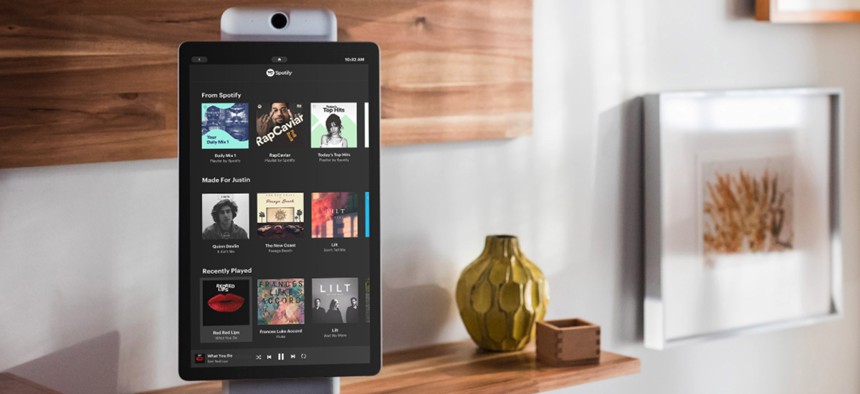Facebook Wants to Be Inside Your House With Portal, its First Physical Device

The company is already facing major consumer-trust issues.
Life was simpler for Facebook back in 2016. The US presidential election was still in the campaign phase. The social media company’s user base was growing, and Cambridge Analytica was nowhere near a household name. So when Facebook began work that year on Portal, its entry into the home-device market, it probably seemed like a pretty straightforward proposition.
Two years later, for a company that’s already facing major consumer-trust issues, a device that gives Facebook yet another point of entry into consumers’ homes and private lives may be a tougher sell.
Facebook’s Portal, which goes on pre-sale today (Oct. 8), is an at-home assistant most similar in functionality to Amazon’s Echo Show. In fact, it includes Amazon’s Alexa voice assistant, as well as a few built-in apps like search tools and Spotify for music streaming. TechCrunch reports that a third-party app platform will enable developers to create additional tools for the Portal.
However, Portal has some unique features. Its voice-navigation system (triggered when it hears the words “Hey Portal”) can lead users to apps like Facebook Messenger for video calls and Facebook Watch for video content. The device also seems to have been designed for a specific purpose that other in-home devices either consider as a secondary function, or don’t have at all: group video chat.
The Portal has an artificial intelligence-powered camera that pans and zooms automatically to keep all faces in the screen, for example. So if, in the middle of a call, you decide to get up from your couch to grab a glass of water, it will track you across the room while you do it. The device also has a four-microphone array to capture 360 degrees of sound, and is designed to work with Storytime, an app that enables a user to essentially perform interactive stories, drawing on Facebook’s VR technology.
It’s Facebook’s very first physical product, and the first thing to come out of Building 8, its research lab for hardware products, which is reportedly also working on technology that can read people’s thoughts.
Given the company’s current reputation, this is a pretty bold launch. In March this year, the Cambridge Analytica scandal revealed that Facebook may have improperly shared up to 87 million users’ personal data. That, along with concerns that Facebook may have unwittingly enabled Russian meddling in the last US presidential election, led Congress to start asking the company difficult questions. In April, Facebook boss Mark Zuckerberg testified before Congress, confirming, among other things, that the company was cooperating with special counsel Robert Mueller’s investigation into Russian influence in the 2016 election. More recently, Facebook made public the news that it had discovered a vulnerability in its platform that enabled hackers to gain access to nearly 50 million accounts.
The data show that the public has lost its trust in Facebook. After years of user growth, in the second quarter of 2018, the company did not add any US or Canadian users, and lost 3 million users in Europe. (In total, Facebook reports 1.47 billion daily users and 2.23 billion active monthly users.) It also said it missed revenue expectations. Facebook stock prices plunged after those announcements in late July, and have never recovered.
Facebook knows what it’s up against. The product page for Portal has just three menu items: “Home,” “Products,” and “Privacy.” Facebook executives told Recode that privacy was the “most important” aspect of the Portal’s development process. Rafa Camargo, the product vice president for Portal, gave Recode a list of Portal’s privacy measures:
- Video calls are encrypted and never recorded or seen by Facebook (though the company can access your call-log data).
- The camera will not capture video when not in use for a call and the mic will only capture sound when it is asked to listen.
- Facebook will not process or log conversations that happen near a Portal when the device not engaged.
- No data collected through Portal will be used to target users with ads on Facebook or any other app.
You can also switch off the camera and microphones manually, although that would seem to make the device pretty useless.
It comes in two sizes: a $199 version with a 10-inch display, and a $349 version with a 15-inch display (the “Portal+”). Portal pre-sales are now underway, and it will ship in November.





